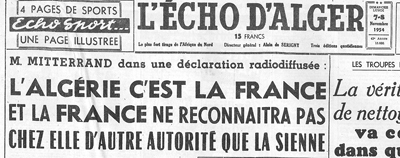Sometimes a thought occurs about something that might make for an interesting blog post, but I realise that whilst I know enough to have the thought, I’d have to do a great deal of research to write something that would survive the scrutiny of people who know their stuff. Still, it may be that commenters who know more than me can say something of value, and that I could at least serve as a prompt. So here goes. An article on the BBC website discusses the recommendations of a French parliamentary committee which described the veil as :
bq. “contrary to the values of the republic” and called on parliament to adopt a formal resolution proclaiming “all of France is saying ‘no’ to the full veil”.
Hmm, I thought. It wasn’t so long ago that “all of France”, at least for some values of “all of France” had a more divided view about the veil. Roughly at this time, in fact:
(Picture nicked from the very excellent Images of France and Algeria blog, which has, incidentally, lots of interesting stuff on the 1961 Paris massacres of Algerians.)
But then I also remembered that official France had not, in fact, been very tolerant of the veiling of Algerian women. The photographer Marc Garanger is famous for his many pictures, taken during the war, of Muslim women forcibly unveiled so that they could be photographed for compulsory ID cards. There are some here . So how did that all work out then? A little googling reveals that this very month, historian Neil MacMaster has a new book entitled _Burning the Veil: The Algerian war and the ’emancipation’ of Muslim women, 1954-62_ (Manchester University Press). I couldn’t find any reviews, as yet. The blurb writes about a campaign of forced modernisation followed by a post-revolutionary backlash involving a worsening of the position of women in Algeria.
So two thoughts then: (1) far from being an aberration in France, there was a very recent period when very many French women (or perhaps “French” women) were veiled; (2) attempts by the state to change that didn’t lead to female emancipation and the triumph of Enlightenment values.
